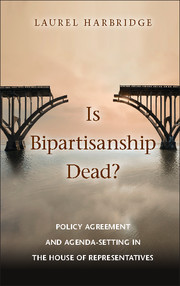Book contents
- Frontmatter
- Contents
- List of figures and tables
- Acknowledgments
- 1 Introduction
- 2 A Puzzle of Declining Bipartisanship
- 3 Strategic Partisan Agenda-Setting
- 4 Agenda-Setting and the Decline of Bipartisan Cooperation
- 5 Variation in Strategic Partisan Agenda-Setting
- 6 Strategic Partisan Agenda-Setting Across Policy Areas
- 7 District Responsiveness and Member-Party Relationships
- 8 The Past, Present, and Future of Bipartisanship
- Appendix
- References
- Index
7 - District Responsiveness and Member-Party Relationships
Published online by Cambridge University Press: 05 March 2015
- Frontmatter
- Contents
- List of figures and tables
- Acknowledgments
- 1 Introduction
- 2 A Puzzle of Declining Bipartisanship
- 3 Strategic Partisan Agenda-Setting
- 4 Agenda-Setting and the Decline of Bipartisan Cooperation
- 5 Variation in Strategic Partisan Agenda-Setting
- 6 Strategic Partisan Agenda-Setting Across Policy Areas
- 7 District Responsiveness and Member-Party Relationships
- 8 The Past, Present, and Future of Bipartisanship
- Appendix
- References
- Index
Summary
[T]he resulting polarization is worrisome. By reducing the space for bipartisanship, it can condemn Congress to gridlock. By driving elected officials to the fringe while citizens inhabit the center, it can alienate citizens from their government.
(“A Polarized Nation?” 2004)This excerpt from a 2004 The Washington Post editorial captures many of the concerns members of the public and political commentators share about party polarization. Beyond expressing alarm about the health of the legislative process and the risk of inaction on important policy initiatives, comments like these focus attention on concerns about the consequences of polarization, suggesting that elected officials are partisan and unresponsive to the public. Rising partisanship damages institutional approval (Ramirez 2009), and high levels of party unity raise fears that elected officials fail to bend away from the party and toward constituent interests (e.g., Hacker and Pierson 2005). As a result, there are concerns that there may be a breakdown in representation. In particular, as party strategies increasingly focus on partisan over bipartisan legislation in roll call votes, members produce heavily partisan voting records regardless of the districts they represent. This signals a decline in responsiveness. This chapter explores the implications of partisan agenda-setting for representation, exploring potential differences in responsiveness between roll call voting and cosponsorship coalitions.
Despite the large number of scholars who have directly examined representation or have considered the implications of various theories for representation, few have looked at responsiveness across various stages of the legislative process or taken into account how the composition of the roll call agenda affects the measures of representation. The shifts over time in agenda-setting documented in previous chapters suggest that roll call vote-based measures of members’ responsiveness to constituent interests may have declined. Yet, given the results discussed elsewhere in this book, it may be that members have nevertheless been able to maintain a greater degree of responsiveness in their cosponsorship behavior. The independence of member behavior at this legislative stage suggests that this may be the case.
- Type
- Chapter
- Information
- Is Bipartisanship Dead?Policy Agreement and Agenda-Setting in the House of Representatives, pp. 140 - 168Publisher: Cambridge University PressPrint publication year: 2015



